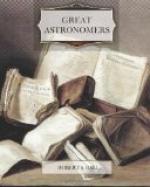A few years later, when the fame of the observatory at Hven became more widely spread, a number of young men flocked to Tycho to study under his direction. He therefore built another observatory for their use in which the instruments were placed in subterranean rooms of which only the roofs appeared above the ground. There was a wonderful poetical inscription over the entrance to this underground observatory, expressing the astonishment of Urania at finding, even in the interior of the earth, a cavern devoted to the study of the heavens. Tycho was indeed always fond of versifying, and he lost no opportunity of indulging this taste whenever an occasion presented itself.
Around the walls of the subterranean observatory were the pictures of eight astronomers, each with a suitable inscription—one of these of course represented Tycho himself, and beneath were written words to the effect that posterity should judge of his work. The eighth picture depicted an astronomer who has not yet come into existence. Tychonides was his name, and the inscription presses the modest hope that when he does appear he will be worthy of his great predecessor. The vast expenses incurred in the erection and the maintenance of this strange establishment were defrayed by a succession of grants from the royal purse.
For twenty years Tycho laboured hard at Uraniborg in the pursuit of science. His work mainly consisted in the determination of the places of the moon, the planets, and the stars on the celestial sphere. The extraordinary pains taken by Tycho to have his observations as accurate as his instruments would permit, have justly entitled him to the admiration of all succeeding astronomers. His island home provided the means of recreation as well as a place for work. He was surrounded by his family, troops of friends were not wanting, and a pet dwarf seems to have been an inmate of his curious residence. By way of change from his astronomical labours he used frequently to work with his students in his chemical laboratory. It is not indeed known what particular problems in chemistry occupied his attention. We are told, however, that he engaged largely in the production of medicines, and as these appear to have been dispensed gratuitously there was no lack of patients.
Tycho’s imperious and grasping character frequently brought him into difficulties, which seem to have increased with his advancing years. He had ill-treated one of his tenants on Hven, and an adverse decision by the courts seems to have greatly exasperated the astronomer. Serious changes also took place in his relations to the court at Copenhagen. When the young king was crowned in 1596, he reversed the policy of his predecessor with reference to Hven. The liberal allowances to Tycho were one after another withdrawn, and finally even his pension was stopped. Tycho accordingly abandoned Hven in a tumult of rage and mortification. A few years later we find him in Bohemia a prematurely aged man, and he died on the 24th October, 1601.




